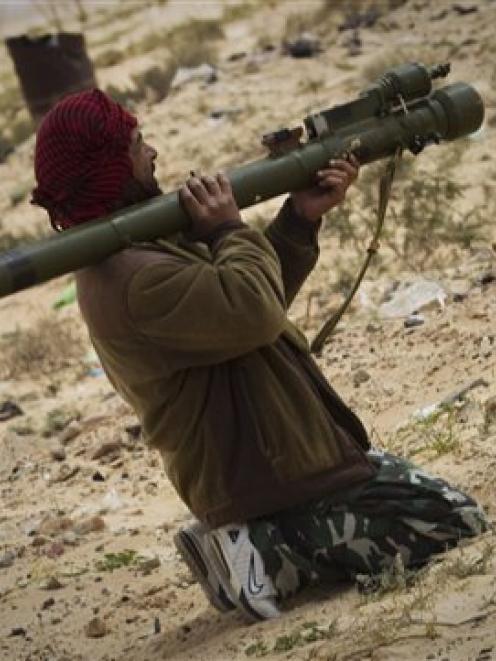
Libya's opposition took haphazard steps to form a government in the east, as they and the US-led force protecting them girded for prolonged and costly fighting. Despite disorganisation among the rebels - and utter confusion over who would ultimately run the international operation - the airstrikes and missiles seemed to have their intended effect in Libya, at least for now.
But the US made clear that others would have to lead the way: Defence Secretary Robert Gates said the US could relinquish control as soon as Saturday. He had no answer when asked about a possible stalemate if Gaddafi hunkers down, and the coalition lacks UN authorisation to target him.
Rear Admiral Gerard Hueber, a top US officer in the campaign in Libya, said international forces were attacking government troops that have been storming population centres. On Wednesday evening, Libyan state television reported a "Crusader colonialist bombing targeting certain civil and military locations" in Tripoli's Tajoura district - scene of some of the heaviest past protests against Gaddafi.
From Ajdabiya in the east to Misrata in the west, the coalition's targets included mechanised forces, mobile surface-to-air missile sites and lines of communications that supply "their beans and their bullets," Hueber told Pentagon reporters by phone from the US command ship in the Mediterranean sea.
A doctor in Misrata said Gaddafi 's tanks fled after the airstrikes, giving a much-needed reprieve to the besieged coastal city, which is inaccessible to human rights monitors or journalists. The airstrikes struck the aviation academy and a vacant lot outside the central hospital, the doctor said.
"Today, for the first time in a week, the bakeries opened their doors," the doctor said, speaking on condition of anonymity for fear of reprisals if Gaddafi's forces take Libya's third-largest city, 200km southeast of Tripoli.
He and rebel leaders said pro-Gaddafi snipers continued to fire on civilians from rooftops on Wednesday. Abdel-Hafidh Ghoga, a spokesman for the opposition forces, said 16 people were killed today, including five children.
Ghoga said people are being treated "in the hallways of buildings" because they did not dare go outside.
In Zintan, a resident said Gaddafi's forces were shelling from the foot of a nearby mountain, but rebels forced their retreat from all but one side of the city. After five days of fighting, Ali al-Azhari said, rebel fighters captured or destroyed several tanks, and seized trucks loaded with 1200 Grad missiles and fuel tanks. They captured five Gaddafi troops.
Al-Azhari, who spoke to The Associated Press by phone from the city, said one officer told rebels he was ordered "to turn Zintan into a desert to be smashed and flattened." Resentment against Gaddafi runs high in Zintan, a city of 100,000 about 120km south of Tripoli, because it was the hometown of many of the detained army officers who took part in a failed coup in 1993.
Ghoga said 16 people died on Tuesday and Wednesday in Zintan, which has no electricity or landlines.
The withdrawal of the tanks from Misrata and Zintan was a rare success for the rebels, who are struggling daily against Gaddafi forces in the eastern gateway city of Ajdabiya. The disorganised opposition holds much of the east but has been unable to take advantage of the international air campaign that saved it from the brink of defeat.
Missiles fired from submarines in the Mediterranean, bombs dropped by B-2 stealth bombers and an array of airstrikes easily total hundreds of millions of dollars for the five-day campaign. Rebels say they are well aware of concerns about who, exactly, the costly campaign is backing.
Iman Bughaigis, a spokeswoman for the rebel force, said the tentative beginnings of an interim administration on Wednesday reflected the realisation that they needed to get organised. She said the leader of the governing body would be Mahmoud Jibril, a US-educated planning expert who defected from the Gaddafi regime as the uprising gained momentum.
"At the beginning, we thought it would just take a week or two weeks" to depose Gaddafi, she said. "Now we know it will take time. We need a government to liberate the eastern territories. It was just because there was a vacuum. We don't have political experience. We are learning as the days go by. Now there is an understanding that we need a structure."
Neither the rebels nor Gadhafi hav mustered the force for an outright victory, raising concerns of a prolonged conflict.
President Barack Obama told the Spanish-language network Univision that a land invasion was "absolutely" out of the question.
Asked about the exit strategy, he didn't lay out a vision for ending the international action, but rather said: "The exit strategy will be executed this week in the sense that we will be pulling back from our much more active efforts to shape the environment."
Gaddafi was defiant in his first public appearance in a week late on Tuesday.
State TV said he spoke from his Bab Al-Aziziya residential compound, the same one hit by a cruise missile on Sunday night. "In the short term, we'll beat them, in the long term, we'll beat them," he said.
Libyan state TV showed footage of a house that was demolished and burning. Weeping women slapped their faces and heads in grief while men carried a barefoot girl covered in blood on a stretcher to an ambulance. A man screamed "a whole family was killed." The TV labelled the footage as "the crusader imperialism bombs civilians."
Gaddafi's regime has alleged that dozens of civilians have been killed in the international bombardment. The Pentagon on Wednesday said there was no evidence of that.






